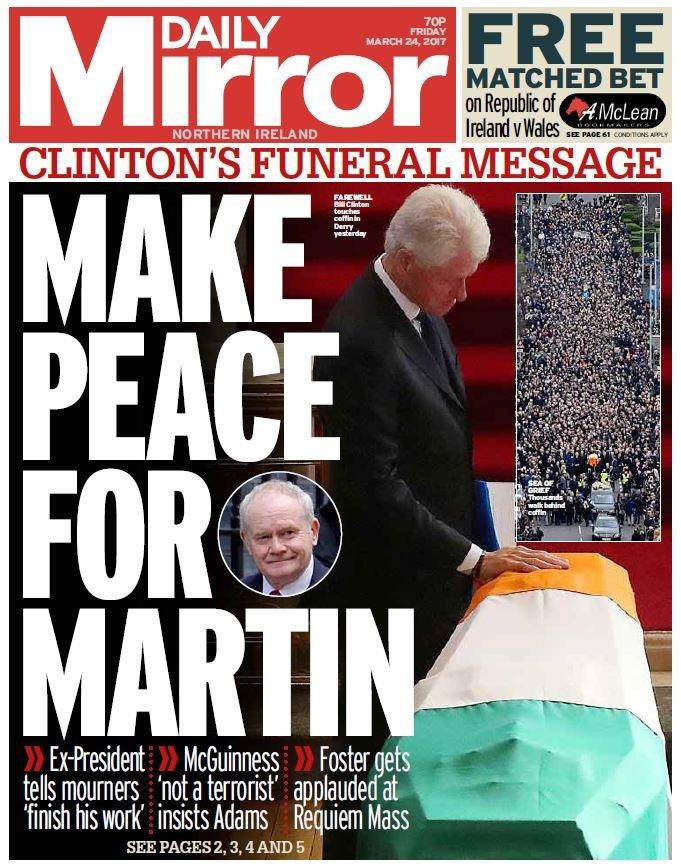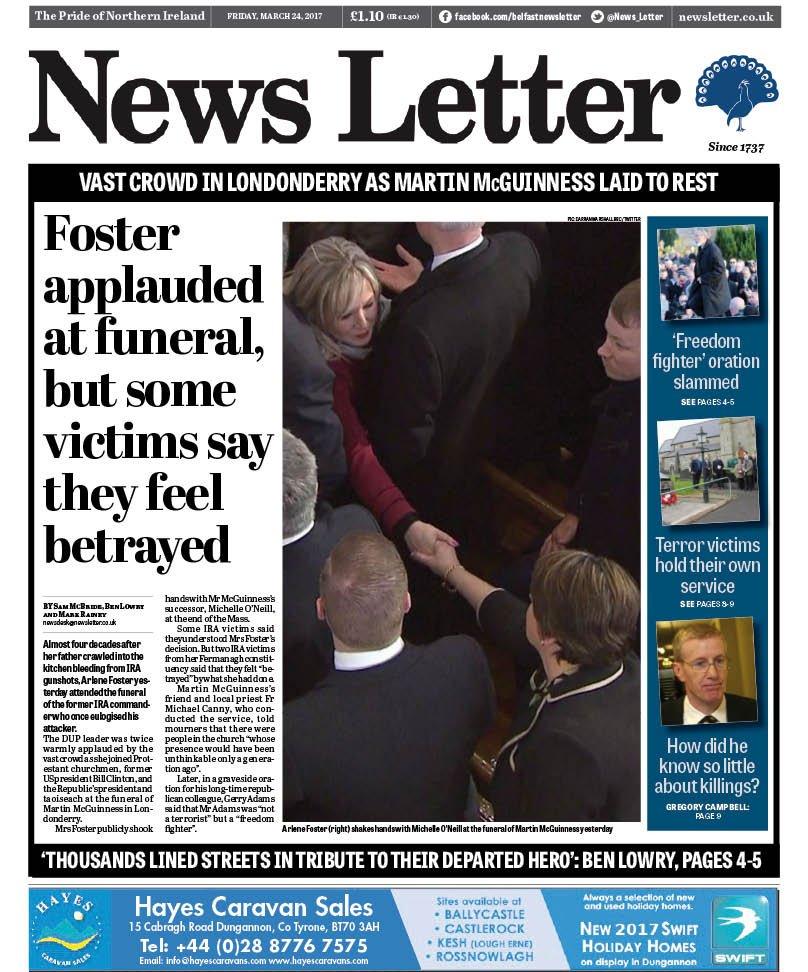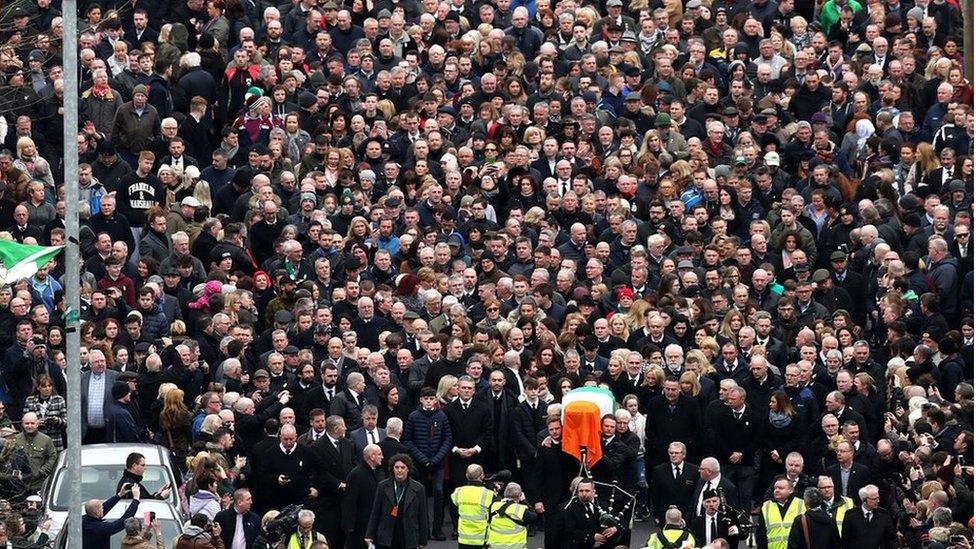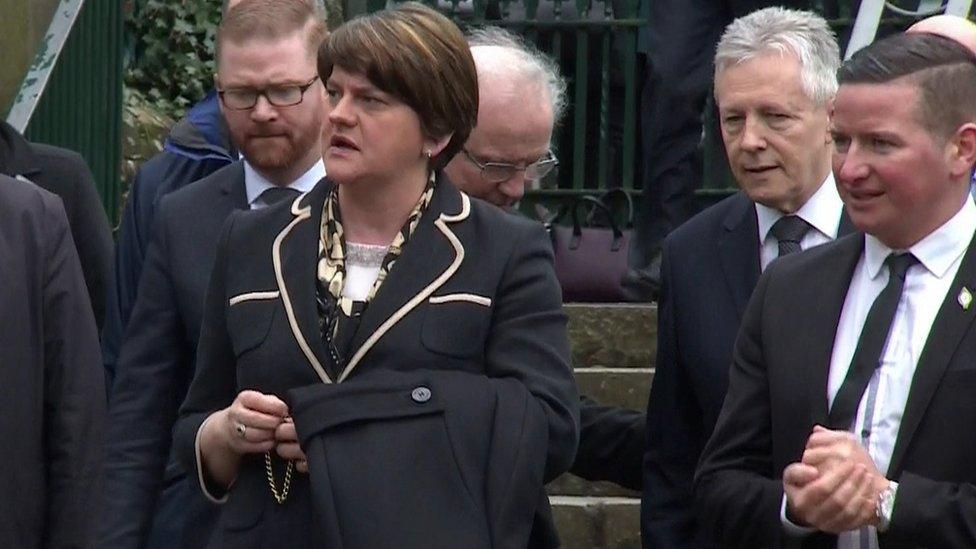Newspaper review: Clinton's call and Foster's decision
- Published


Usually we focus on headlines and stories leading Northern Ireland's daily newspapers. But, this day, it feels apt to focus initially on the images jumping out from today's front pages after the funeral of Martin McGuinness on Thursday.
A seemingly endless throng following a coffin through the streets of Derry (Irish News).
Sinn Féin's leader north of the border reaching through a crowd to shake the outstretched hand of the DUP leader (News Letter).
A coffin draped in an Irish tricolour carried by Mr McGuinness' family (Belfast Telegraph).
A former US president reaching out and gently placing his hand on the coffin during a funeral service (Daily Mirror).
'Make peace for Martin'
The funeral created images that are likely to become an indelible part of Northern Ireland's visual history, and Friday's front pages kick off their coverage of the event by showcasing some of the best.
The Daily Mirror pairs that image of former US president Bill Clinton with the headline: "Make peace for Martin".
Maurice Fitzmaurice, the paper's reporter, describes it as a "powerful and typically engaging speech" that brought "passion and laughter" to the funeral.
"Mr Clinton had been asked to speak for three minutes at the funeral, but delivered more than 10 minutes both aspirational and inspirational," he adds.
The Irish News' front page features that striking image of the huge crowd following Mr McGuinness' funeral procession under the headline: "Final journey".
Inside, Seamus McKinney writes that the funeral was "that strange Irish mix of public pride and private grief".
"At all times, his funeral was dignified and decorous; some said the closest to a state funeral Derry had ever seen.
"But it was no state funeral; it was a very Irish funeral, organised by his family and managed by the people of Derry."

Thousands followed the funeral procession of Martin McGuinness
Elsewhere, the paper praised DUP leader Arlene Foster's decision to attend.
Political correspondent John Manley writes that the decision was not a "straightforward" one but "set a conciliatory tone" for the Stormont talks ahead.
The Irish News' editorial underlines the point: "It is unfortunate that it took Mrs Foster so long to make known her decision to attend, but it was undoubtedly the correct thing to do - as the applause which greeted her at St Columba's Church affirmed - and should be seen as a positive gesture of leadership."
However, the News Letter strikes a more reserved tone over Mrs Foster's presence, alongside that image of the DUP leader shaking hands with Michelle O'Neill.
"Foster applauded at funeral, but some victims say they feel betrayed," is the front-page headline.
Inside, it reports that Mrs Foster's "11th-hour decision" had earnt "widespread praise - but outraged some victims of the IRA".
Aileen Quinton, whose mother died in the Enniskillen bomb in 1987, tells the paper that she felt "totally betrayed".
The News Letter says that Ms Quinton had been "a friend of Mrs Foster for many years".

DUP leader Arlene Foster arriving at the funeral of Martin McGuinness w
Meanwhile, the newspaper's deputy editor Ben Lowry writes that while this was not a "military funeral, it was almost a royal one - Sinn Féin royalty".
The News Letter's editorial says that the "goodwill of unionist attendance" may have "cleared the air in a favourable way".
"There was a mood in the air yesterday among politicians that a deal was possible," it writes.
"If that can be done without capitulation to a rampant Sinn Féin, it will be a hopeful development in these perilous times."
The Belfast Telegraph also reflects on Mrs Foster's decision to attend in its front-page headline: "Private grief and a public gesture".
Inside, Ivan Little writes: "The normally self-assured Arlene Foster looked pensive and nervous as she took her first tentative steps into what she once might have regarded as the lion's den of Martin McGuinness' Bogside.
"But the response from the Catholic faithful at his hilltop Long Tower church... seemed to put her at ease as the mourners acknowledged a galvanising, unifying gesture of goodwill."
Columnist Lindy McDowell praises Mrs Foster's decision, writing that she had made the "toughest journey" as "a relative of a victim of IRA savagery".
"Arlene Foster chose to the right thing and to go and pay her respects.
"From the little girl cowering in terror in her family home through to the woman who became the leader of unionism and then, the first minister of Northern Ireland, that was a pretty momentous journey too."